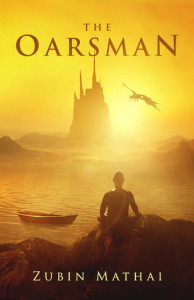★★★★★
Many authors attempt to bridge the gap between metaphysical, philosophical and narrative elements, but few succeed as effectively as Zubin Mathai in The Oarsman. This is a novel that stands out of time and space, and brings readers on a surreal journey back up the long river of the Man’s years, a nameless protagonist seeking meaning and validation as he nears the end of his life.
At the behest of the god-like Judge and with the help of the mysterious, titular Oarsman, the Man sails back upstream, through the many different lives he has led, including those abandoned for more success, those abruptly cut short, and those that went underappreciated when he was young and full of vitality. While meeting his younger selves and observing his own existence from the distance of age, insights are finally possible, and by trailing the stream of his life, he can finally understand where he went wrong – and right.
The specificity of the Man’s story is juxtaposed with the universality of his emotions – regret, longing, nostalgia, and the wisdom of advanced age. Hindsight, in this case, is a double-edged sword, and as the Man travels father upstream, it becomes painfully apparent that the complexities of his years were not as superficial as he once assumed while recollecting his achievements and failures. He is actively led through the bitter moments of pain, and the formative instants with past lovers, many of whom shaped what he has become.
However, the story is not simply a nostalgic journey through the past, but also an action-packed adventure through his own memories. By moving backwards through his life, the author peels back layers of the man’s personality like an onion, and also puts him through countless temptations to change direction or alter his own soul. The Oarsman is a passive figure, yet hugely influential, and seems to represent the search for beauty, or the awareness of the transcendent. The Man changes noticeably over the course of the book, as he is forced to come, literally, face to face with his past.
Mathai has a masterful way with words, and the slow evolution of the Man is inspiring, reminding readers of the dynamic nature of life. The writing promotes personal reflection of the readers’ own character, and one’s shifting priorities and personalities, reminding us that even seemingly insignificant forks in the road can be powerful and profound.
The writing is cloaked in mystery, and the mood of the novel is consistent and carefully crafted. It all reads like some strange dream, from which readers and the Man will soon awaken, making for a wildly enjoyable and unpredictable read. Even with the book’s idiosyncratic nature, there is a strong, focused tone, revealing the author’s complete control over his own process and story. A meticulously edited book, there are also few distractions in terms of grammatical errors or tangential moments within the plot.
With the delicate touch of a gifted writer, Mathai shares his deeply moving philosophy without being forceful or demonstrative. The evolving nature of the story guides readers on their own river of revelation, something that most writers only achieve for brief instants of a narrative – rarely from start to finish, as Mathai has achieved here.
Links
Author Site
Amazon
Barnes & Noble
Goodreads
STAR RATING
Design
Editing
Content
Get an Editorial Review | Get Amazon Sales & Reviews | Get Edited | Get Beta Readers | Enter the SPR Book Awards | Other Marketing Services
























Leave A Comment